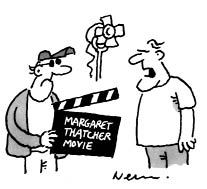Here’s something that continues to perplex me.
Here’s something that continues to perplex me. How is it that the best of American cinema and theatre is so often simultaneously sharp, sophisticated — and trite?
I’ve just been to see a tremendous new play at the Almeida in Islington, whose run ends this week. Becky Shaw has been a hit on Broadway and has enjoyed instant appeal in London too. It certainly appealed to me. Gina Gionfriddo has written a mordant, mostly cruel comedy of modern American manners, and the action and the repartee rattle along, intense, quickfire and merciless, with a brutality that leaves you breathless.
This is not a theatre review, so suffice it to say that every one of the small cast is superb; and that it’s a story of family schism and family feeling, love, sex, money, marriage, dependency, psychosis and rejection.
Enough. For I come not quite to praise. What troubles me is exactly what troubled me at the end of a marvellous evening at the cinema last year, watching Up In The Air, a scintillating comedy starring George Clooney, for which one could offer almost the synopsis I’ve just given of Becky Shaw — with the addition of many airports, wheelie suitcases and excruciating video conferences. This too was observant, bitter, sceptical and stylish: sophisticated beyond measure. I can think of no mainstream British screenwriter or playwright since Congreve or Sheridan willing and able to be so unkind, unsparing, fast and funny. I emerged from the cinema last year, and the theatre last week, dazed by not only by the virtuosity but the intelligence: and the sneering, vulgar impertinence of it all. It made most British comedy seem laboured: lumbering, obvious and slow; sweet cider to their Fernet Branca; Fawlty Towers to their Curb Your Enthusiasm.
But here’s the But. Why then do both these American comedies, at just the point when they should spin off into a painful yet bracing conclusion, collapse instead into big, quivering heaps of jelly?
Up In The Air was about a romance between a high-flying corporate hit-man who had avoided commitment all his life and a high-flying female executive for whom the comforts of marriage, home and family were not proving enough. Everything — all the wit, all the observation — pointed to a conclusion that was bleak or shocking. But when that moment of denouement was reached… squelch. She went back to her family and he to his career. In a sub-plot within that story he’s summoned to rescue a family wedding where the groom has at the 11th hour thought better of it all. Dialogue, characterisation and direction cry out for his opting to intervene as the family do not wish — and urge the young chap to walk away. But… squelch. He tells the doubting groom how beautiful married love can be. Wedding bells chime.
So, too, in Becky Shaw. A man and his adoptive sister fight each other, love each other and have fun together; but she’s gone and married a cute, dim, caring hunk she met on a skiing holiday. Every instinct, and all the dynamics of the play, say ‘Leave this pretty-boy and go back to the thrills and antagonisms of an affair with your spiky, less attractive older adopted sibling!’ But… squelch. Her young husband discovers in himself a manly command; she buckles; and they head for the Florida sunset swearing fidelity until death.
What is this sickness? Is it American Christianity? American Judaism? There’s certainly something New York Jewish in the splicing of sceptical intelligence and prosecuting intellect with a cloyingly folksy subordination to happy-ever-after schlock. And there’s something small-town American Christian about the steel-hooping of harsh, straight-talking honesty with the final triumph of family values and the American way. Think of Mark Twain. Think of West Side Story.
This amalgam of opposites reaches some kind of apotheosis, perhaps, in Walt Disney: the tyranny of saccharine, but over an underworld of folly, viciousness and wit. Maybe I should have been less surprised when for my BBC Radio 4 series, Great Lives, that most sadistic of cartoonists, Gerald Scarfe, chose the Disney Corporation’s founder, Walt himself, as his hero. Cruella de Vil meets Bambi. Cruella’s what’s cleverest about the American imagination. But in the end, Bambi wins. The acid drops turn out finally to be sweet.
The American author who to me best encapsulates not only the contradiction, but the aching acknowledgement that there is a contradiction, and that it isn’t quite satisfactory, was the mid-20th-century Christian humanist playwright and novelist Thornton Wilder. His most famous play, Our Town, is performed too rarely in Britain. There is no cleverness at all about it, no showiness, nothing but love and understanding for the small-town family whose lives, deaths and after-lives the play chronicles. The script is almost devoid of dislike; nobody wins, nobody loses. Yet it’s neither negative nor hokey. The Happy Journey is a one-act play that requires no scenery, just a mother and father and the two surviving of their three children, seated on stage as in a family car. You can call it ‘affirmative’ — it is about family tragedy in a good family with a strong and loving mother — but the undertones are also there of a kind of tyranny, with things that are to be known but never spelled out; things that may be thought but not said; and things that are not even to be thought. Both plays always reduce me to tears, as does Wilder’s The Skin Of Our Teeth.
Such writing, quite out of fashion today, lacks the sharp teeth of modern American fiction, but bites deeper. For all its dazzling acidity, in the end Becky Shaw only amuses.







Comments